The Role of Creativity in Science Education: A Psychology Essay
VerifiedAdded on 2022/10/17
|6
|1342
|297
Essay
AI Summary
This essay delves into the crucial role of creativity within science education, emphasizing its significance in fostering cognitive development, communication skills, and critical thinking in children. It begins by highlighting the importance of science as a subject in pedagogy, setting the stage for an in-depth exploration of creativity's various aspects in the science curriculum. The discussion identifies key elements of creativity related to science, such as associative thinking, creative imagination, and the development of new insights, while also analyzing the role and significance of creativity in science education. Furthermore, the essay provides an overview of effective teaching practices that can be incorporated by educators to implement creativity, including the use of visual aids, real-world learning experiences, and hands-on activities. By examining these elements, the essay offers insights into creating an engaging and effective learning environment for students. The conclusion emphasizes the interconnectedness of creativity and science, reinforcing the need for creative teaching strategies to enhance both understanding and interest in the subject matter.
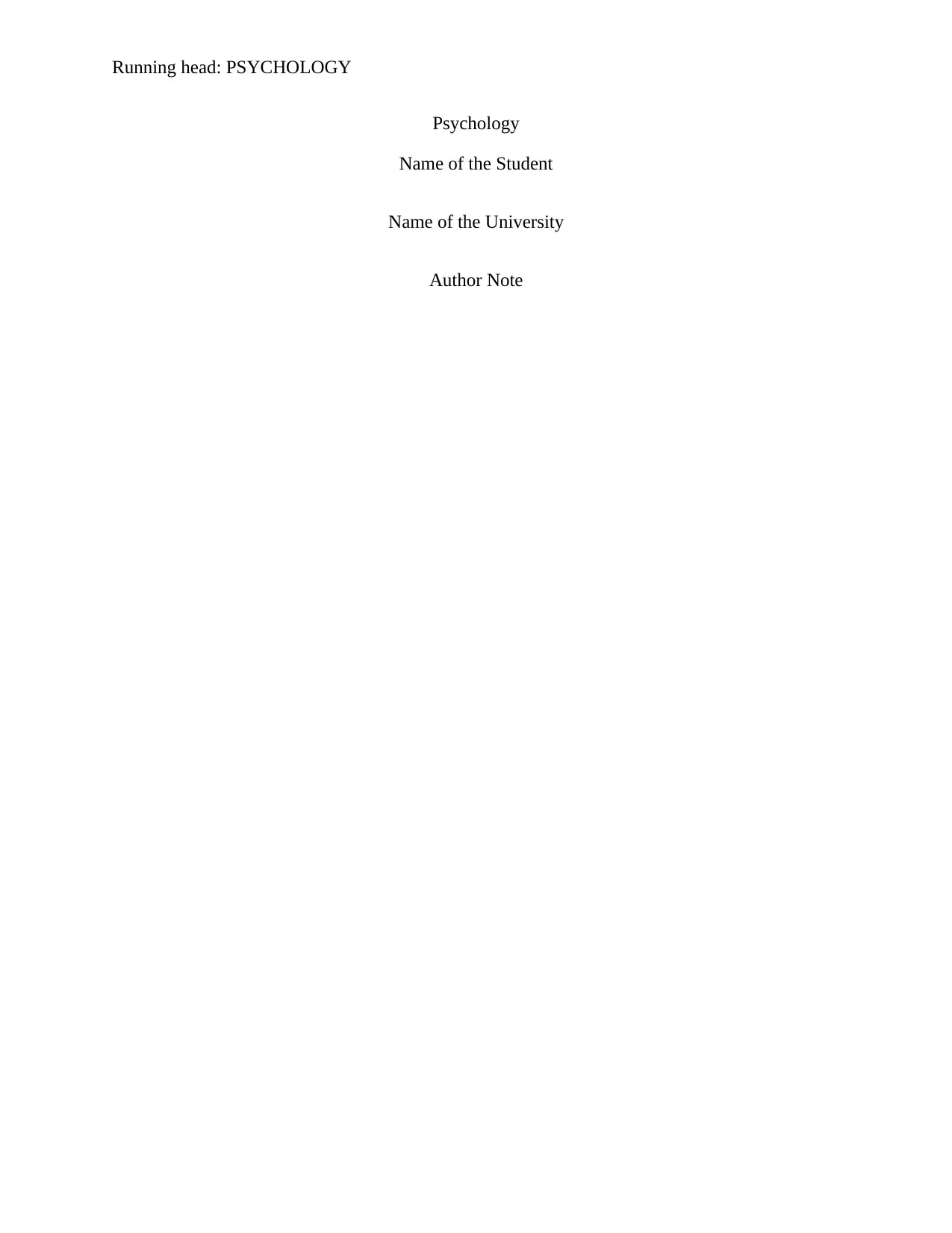
Running head: PSYCHOLOGY
Psychology
Name of the Student
Name of the University
Author Note
Psychology
Name of the Student
Name of the University
Author Note
Paraphrase This Document
Need a fresh take? Get an instant paraphrase of this document with our AI Paraphraser
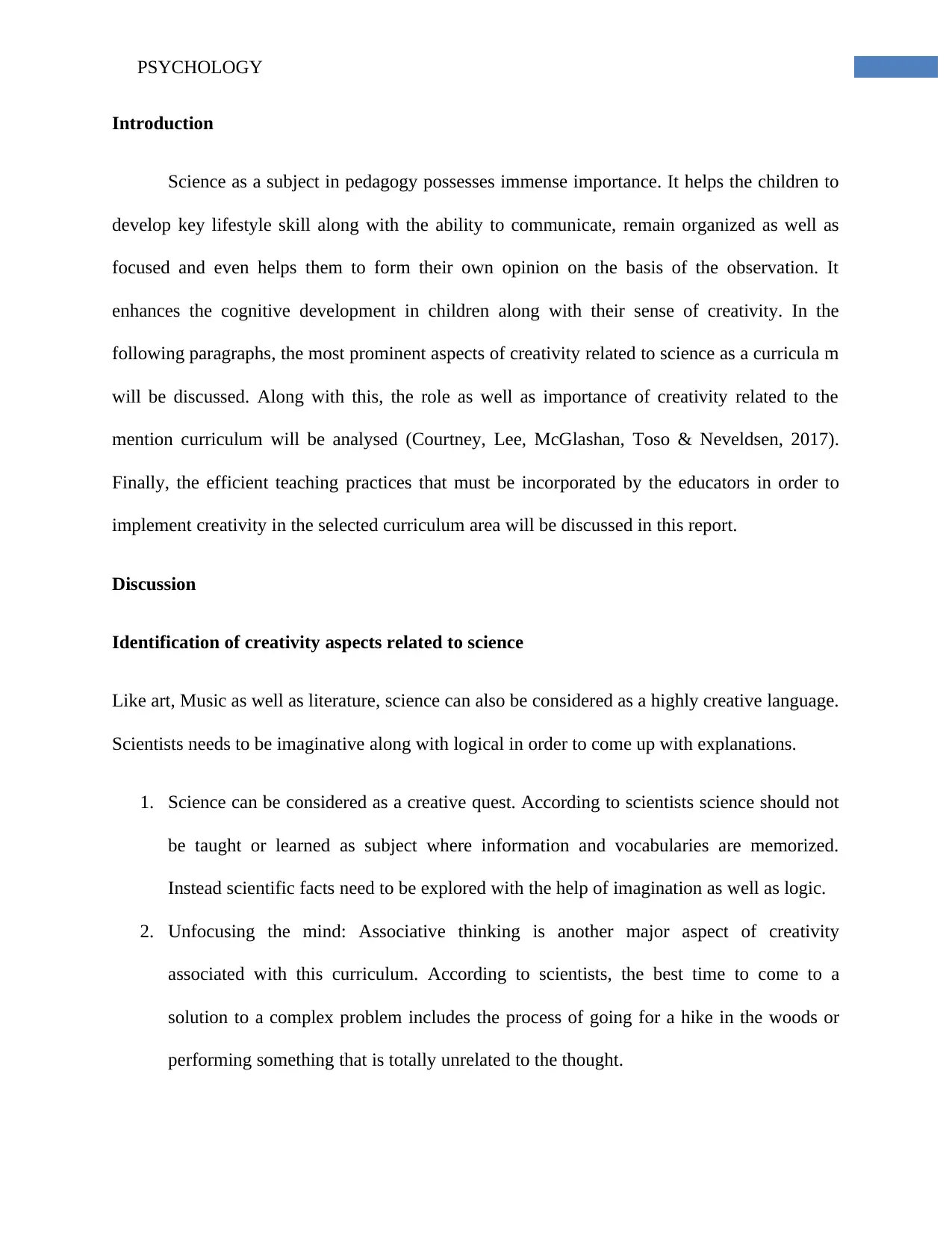
1PSYCHOLOGY
Introduction
Science as a subject in pedagogy possesses immense importance. It helps the children to
develop key lifestyle skill along with the ability to communicate, remain organized as well as
focused and even helps them to form their own opinion on the basis of the observation. It
enhances the cognitive development in children along with their sense of creativity. In the
following paragraphs, the most prominent aspects of creativity related to science as a curricula m
will be discussed. Along with this, the role as well as importance of creativity related to the
mention curriculum will be analysed (Courtney, Lee, McGlashan, Toso & Neveldsen, 2017).
Finally, the efficient teaching practices that must be incorporated by the educators in order to
implement creativity in the selected curriculum area will be discussed in this report.
Discussion
Identification of creativity aspects related to science
Like art, Music as well as literature, science can also be considered as a highly creative language.
Scientists needs to be imaginative along with logical in order to come up with explanations.
1. Science can be considered as a creative quest. According to scientists science should not
be taught or learned as subject where information and vocabularies are memorized.
Instead scientific facts need to be explored with the help of imagination as well as logic.
2. Unfocusing the mind: Associative thinking is another major aspect of creativity
associated with this curriculum. According to scientists, the best time to come to a
solution to a complex problem includes the process of going for a hike in the woods or
performing something that is totally unrelated to the thought.
Introduction
Science as a subject in pedagogy possesses immense importance. It helps the children to
develop key lifestyle skill along with the ability to communicate, remain organized as well as
focused and even helps them to form their own opinion on the basis of the observation. It
enhances the cognitive development in children along with their sense of creativity. In the
following paragraphs, the most prominent aspects of creativity related to science as a curricula m
will be discussed. Along with this, the role as well as importance of creativity related to the
mention curriculum will be analysed (Courtney, Lee, McGlashan, Toso & Neveldsen, 2017).
Finally, the efficient teaching practices that must be incorporated by the educators in order to
implement creativity in the selected curriculum area will be discussed in this report.
Discussion
Identification of creativity aspects related to science
Like art, Music as well as literature, science can also be considered as a highly creative language.
Scientists needs to be imaginative along with logical in order to come up with explanations.
1. Science can be considered as a creative quest. According to scientists science should not
be taught or learned as subject where information and vocabularies are memorized.
Instead scientific facts need to be explored with the help of imagination as well as logic.
2. Unfocusing the mind: Associative thinking is another major aspect of creativity
associated with this curriculum. According to scientists, the best time to come to a
solution to a complex problem includes the process of going for a hike in the woods or
performing something that is totally unrelated to the thought.
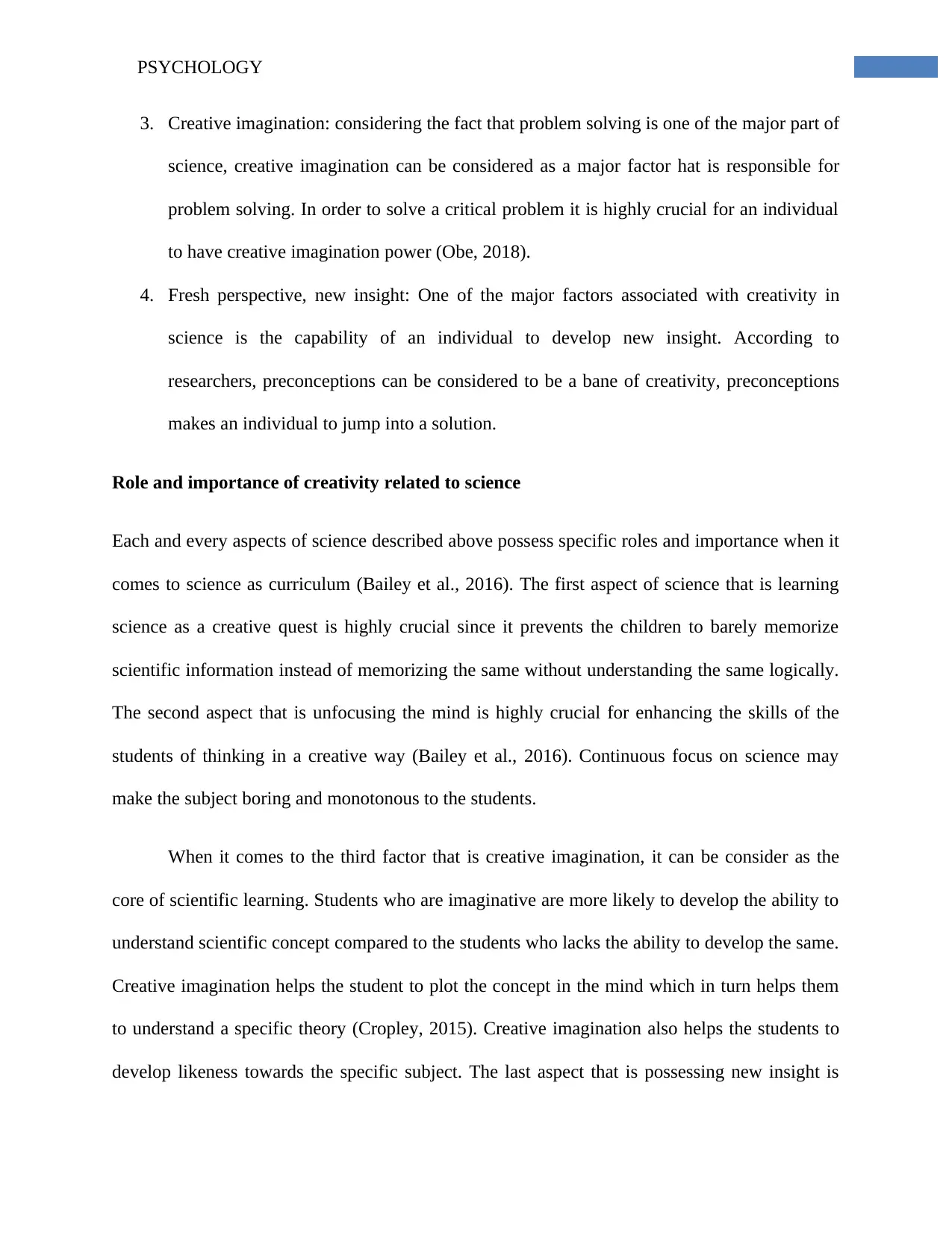
2PSYCHOLOGY
3. Creative imagination: considering the fact that problem solving is one of the major part of
science, creative imagination can be considered as a major factor hat is responsible for
problem solving. In order to solve a critical problem it is highly crucial for an individual
to have creative imagination power (Obe, 2018).
4. Fresh perspective, new insight: One of the major factors associated with creativity in
science is the capability of an individual to develop new insight. According to
researchers, preconceptions can be considered to be a bane of creativity, preconceptions
makes an individual to jump into a solution.
Role and importance of creativity related to science
Each and every aspects of science described above possess specific roles and importance when it
comes to science as curriculum (Bailey et al., 2016). The first aspect of science that is learning
science as a creative quest is highly crucial since it prevents the children to barely memorize
scientific information instead of memorizing the same without understanding the same logically.
The second aspect that is unfocusing the mind is highly crucial for enhancing the skills of the
students of thinking in a creative way (Bailey et al., 2016). Continuous focus on science may
make the subject boring and monotonous to the students.
When it comes to the third factor that is creative imagination, it can be consider as the
core of scientific learning. Students who are imaginative are more likely to develop the ability to
understand scientific concept compared to the students who lacks the ability to develop the same.
Creative imagination helps the student to plot the concept in the mind which in turn helps them
to understand a specific theory (Cropley, 2015). Creative imagination also helps the students to
develop likeness towards the specific subject. The last aspect that is possessing new insight is
3. Creative imagination: considering the fact that problem solving is one of the major part of
science, creative imagination can be considered as a major factor hat is responsible for
problem solving. In order to solve a critical problem it is highly crucial for an individual
to have creative imagination power (Obe, 2018).
4. Fresh perspective, new insight: One of the major factors associated with creativity in
science is the capability of an individual to develop new insight. According to
researchers, preconceptions can be considered to be a bane of creativity, preconceptions
makes an individual to jump into a solution.
Role and importance of creativity related to science
Each and every aspects of science described above possess specific roles and importance when it
comes to science as curriculum (Bailey et al., 2016). The first aspect of science that is learning
science as a creative quest is highly crucial since it prevents the children to barely memorize
scientific information instead of memorizing the same without understanding the same logically.
The second aspect that is unfocusing the mind is highly crucial for enhancing the skills of the
students of thinking in a creative way (Bailey et al., 2016). Continuous focus on science may
make the subject boring and monotonous to the students.
When it comes to the third factor that is creative imagination, it can be consider as the
core of scientific learning. Students who are imaginative are more likely to develop the ability to
understand scientific concept compared to the students who lacks the ability to develop the same.
Creative imagination helps the student to plot the concept in the mind which in turn helps them
to understand a specific theory (Cropley, 2015). Creative imagination also helps the students to
develop likeness towards the specific subject. The last aspect that is possessing new insight is
⊘ This is a preview!⊘
Do you want full access?
Subscribe today to unlock all pages.

Trusted by 1+ million students worldwide
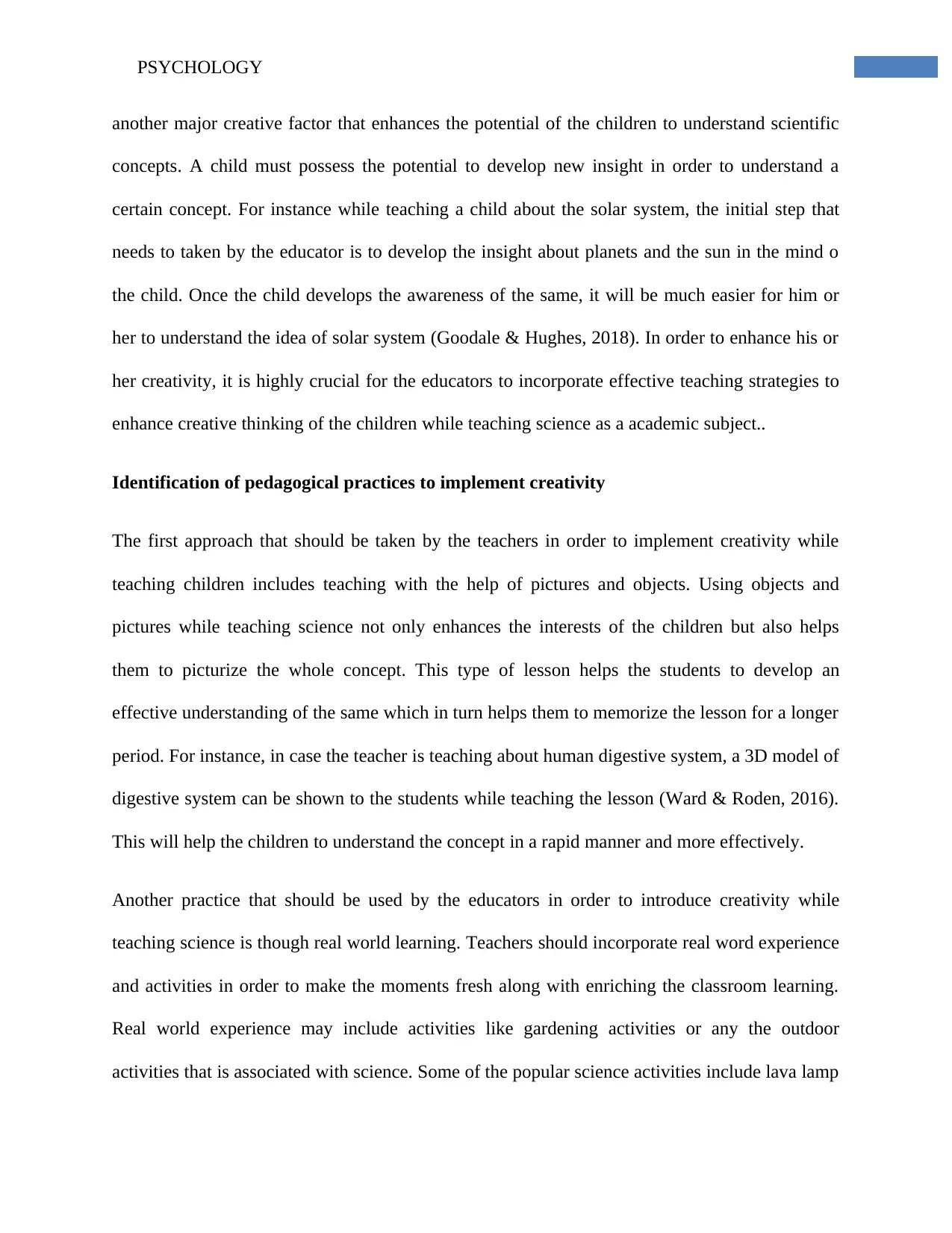
3PSYCHOLOGY
another major creative factor that enhances the potential of the children to understand scientific
concepts. A child must possess the potential to develop new insight in order to understand a
certain concept. For instance while teaching a child about the solar system, the initial step that
needs to taken by the educator is to develop the insight about planets and the sun in the mind o
the child. Once the child develops the awareness of the same, it will be much easier for him or
her to understand the idea of solar system (Goodale & Hughes, 2018). In order to enhance his or
her creativity, it is highly crucial for the educators to incorporate effective teaching strategies to
enhance creative thinking of the children while teaching science as a academic subject..
Identification of pedagogical practices to implement creativity
The first approach that should be taken by the teachers in order to implement creativity while
teaching children includes teaching with the help of pictures and objects. Using objects and
pictures while teaching science not only enhances the interests of the children but also helps
them to picturize the whole concept. This type of lesson helps the students to develop an
effective understanding of the same which in turn helps them to memorize the lesson for a longer
period. For instance, in case the teacher is teaching about human digestive system, a 3D model of
digestive system can be shown to the students while teaching the lesson (Ward & Roden, 2016).
This will help the children to understand the concept in a rapid manner and more effectively.
Another practice that should be used by the educators in order to introduce creativity while
teaching science is though real world learning. Teachers should incorporate real word experience
and activities in order to make the moments fresh along with enriching the classroom learning.
Real world experience may include activities like gardening activities or any the outdoor
activities that is associated with science. Some of the popular science activities include lava lamp
another major creative factor that enhances the potential of the children to understand scientific
concepts. A child must possess the potential to develop new insight in order to understand a
certain concept. For instance while teaching a child about the solar system, the initial step that
needs to taken by the educator is to develop the insight about planets and the sun in the mind o
the child. Once the child develops the awareness of the same, it will be much easier for him or
her to understand the idea of solar system (Goodale & Hughes, 2018). In order to enhance his or
her creativity, it is highly crucial for the educators to incorporate effective teaching strategies to
enhance creative thinking of the children while teaching science as a academic subject..
Identification of pedagogical practices to implement creativity
The first approach that should be taken by the teachers in order to implement creativity while
teaching children includes teaching with the help of pictures and objects. Using objects and
pictures while teaching science not only enhances the interests of the children but also helps
them to picturize the whole concept. This type of lesson helps the students to develop an
effective understanding of the same which in turn helps them to memorize the lesson for a longer
period. For instance, in case the teacher is teaching about human digestive system, a 3D model of
digestive system can be shown to the students while teaching the lesson (Ward & Roden, 2016).
This will help the children to understand the concept in a rapid manner and more effectively.
Another practice that should be used by the educators in order to introduce creativity while
teaching science is though real world learning. Teachers should incorporate real word experience
and activities in order to make the moments fresh along with enriching the classroom learning.
Real world experience may include activities like gardening activities or any the outdoor
activities that is associated with science. Some of the popular science activities include lava lamp
Paraphrase This Document
Need a fresh take? Get an instant paraphrase of this document with our AI Paraphraser
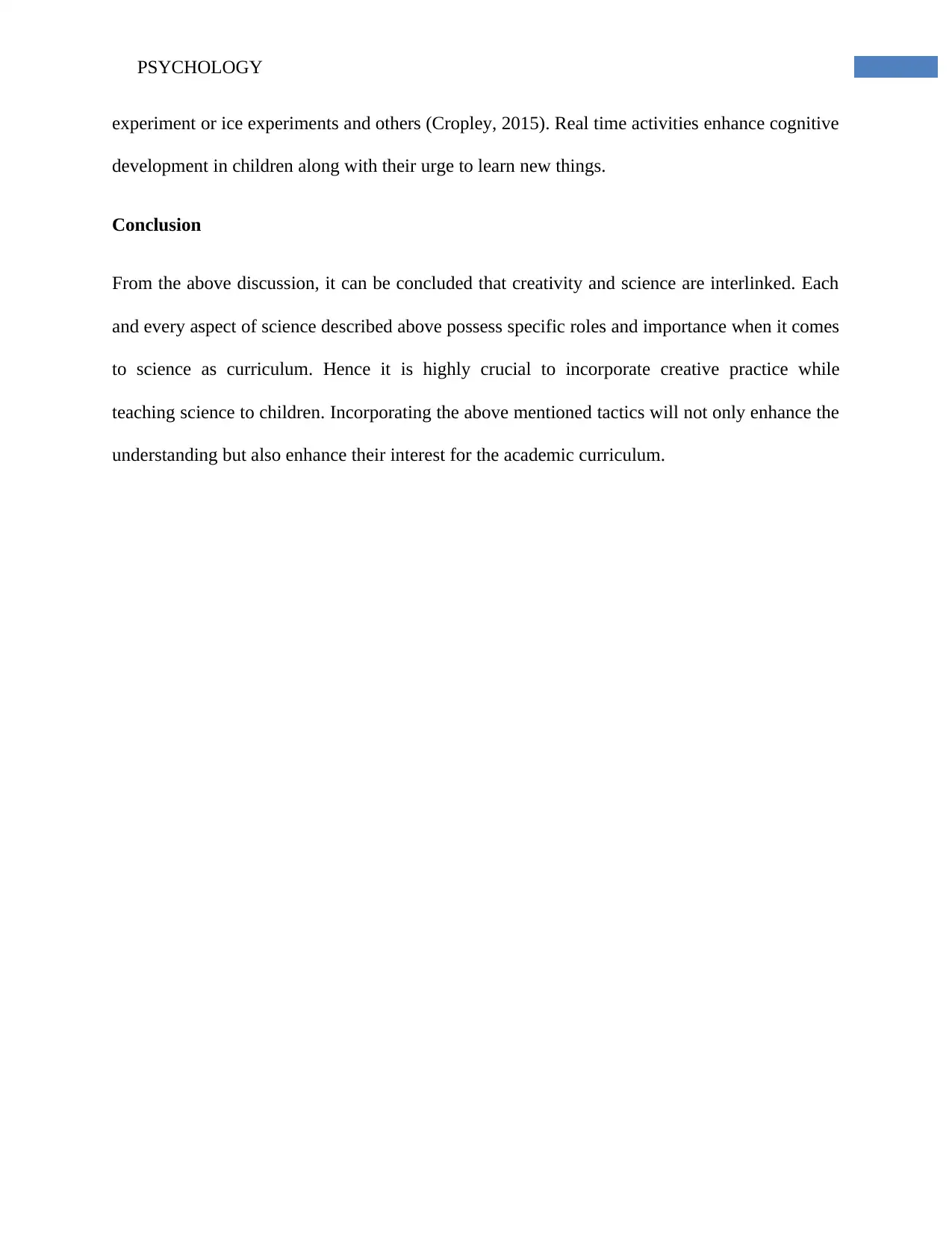
4PSYCHOLOGY
experiment or ice experiments and others (Cropley, 2015). Real time activities enhance cognitive
development in children along with their urge to learn new things.
Conclusion
From the above discussion, it can be concluded that creativity and science are interlinked. Each
and every aspect of science described above possess specific roles and importance when it comes
to science as curriculum. Hence it is highly crucial to incorporate creative practice while
teaching science to children. Incorporating the above mentioned tactics will not only enhance the
understanding but also enhance their interest for the academic curriculum.
experiment or ice experiments and others (Cropley, 2015). Real time activities enhance cognitive
development in children along with their urge to learn new things.
Conclusion
From the above discussion, it can be concluded that creativity and science are interlinked. Each
and every aspect of science described above possess specific roles and importance when it comes
to science as curriculum. Hence it is highly crucial to incorporate creative practice while
teaching science to children. Incorporating the above mentioned tactics will not only enhance the
understanding but also enhance their interest for the academic curriculum.
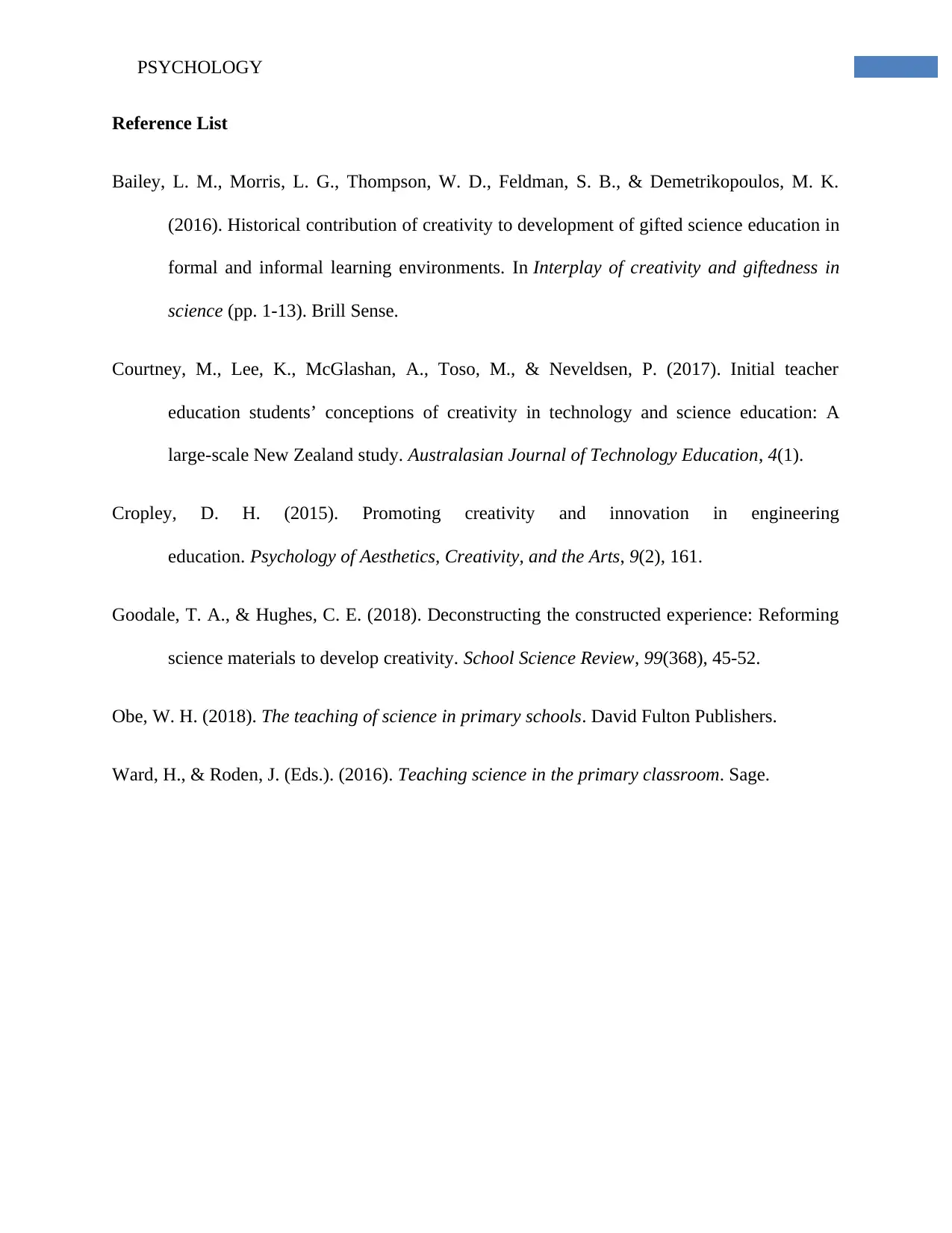
5PSYCHOLOGY
Reference List
Bailey, L. M., Morris, L. G., Thompson, W. D., Feldman, S. B., & Demetrikopoulos, M. K.
(2016). Historical contribution of creativity to development of gifted science education in
formal and informal learning environments. In Interplay of creativity and giftedness in
science (pp. 1-13). Brill Sense.
Courtney, M., Lee, K., McGlashan, A., Toso, M., & Neveldsen, P. (2017). Initial teacher
education students’ conceptions of creativity in technology and science education: A
large-scale New Zealand study. Australasian Journal of Technology Education, 4(1).
Cropley, D. H. (2015). Promoting creativity and innovation in engineering
education. Psychology of Aesthetics, Creativity, and the Arts, 9(2), 161.
Goodale, T. A., & Hughes, C. E. (2018). Deconstructing the constructed experience: Reforming
science materials to develop creativity. School Science Review, 99(368), 45-52.
Obe, W. H. (2018). The teaching of science in primary schools. David Fulton Publishers.
Ward, H., & Roden, J. (Eds.). (2016). Teaching science in the primary classroom. Sage.
Reference List
Bailey, L. M., Morris, L. G., Thompson, W. D., Feldman, S. B., & Demetrikopoulos, M. K.
(2016). Historical contribution of creativity to development of gifted science education in
formal and informal learning environments. In Interplay of creativity and giftedness in
science (pp. 1-13). Brill Sense.
Courtney, M., Lee, K., McGlashan, A., Toso, M., & Neveldsen, P. (2017). Initial teacher
education students’ conceptions of creativity in technology and science education: A
large-scale New Zealand study. Australasian Journal of Technology Education, 4(1).
Cropley, D. H. (2015). Promoting creativity and innovation in engineering
education. Psychology of Aesthetics, Creativity, and the Arts, 9(2), 161.
Goodale, T. A., & Hughes, C. E. (2018). Deconstructing the constructed experience: Reforming
science materials to develop creativity. School Science Review, 99(368), 45-52.
Obe, W. H. (2018). The teaching of science in primary schools. David Fulton Publishers.
Ward, H., & Roden, J. (Eds.). (2016). Teaching science in the primary classroom. Sage.
⊘ This is a preview!⊘
Do you want full access?
Subscribe today to unlock all pages.

Trusted by 1+ million students worldwide
1 out of 6
Your All-in-One AI-Powered Toolkit for Academic Success.
+13062052269
info@desklib.com
Available 24*7 on WhatsApp / Email
![[object Object]](/_next/static/media/star-bottom.7253800d.svg)
Unlock your academic potential
Copyright © 2020–2026 A2Z Services. All Rights Reserved. Developed and managed by ZUCOL.
